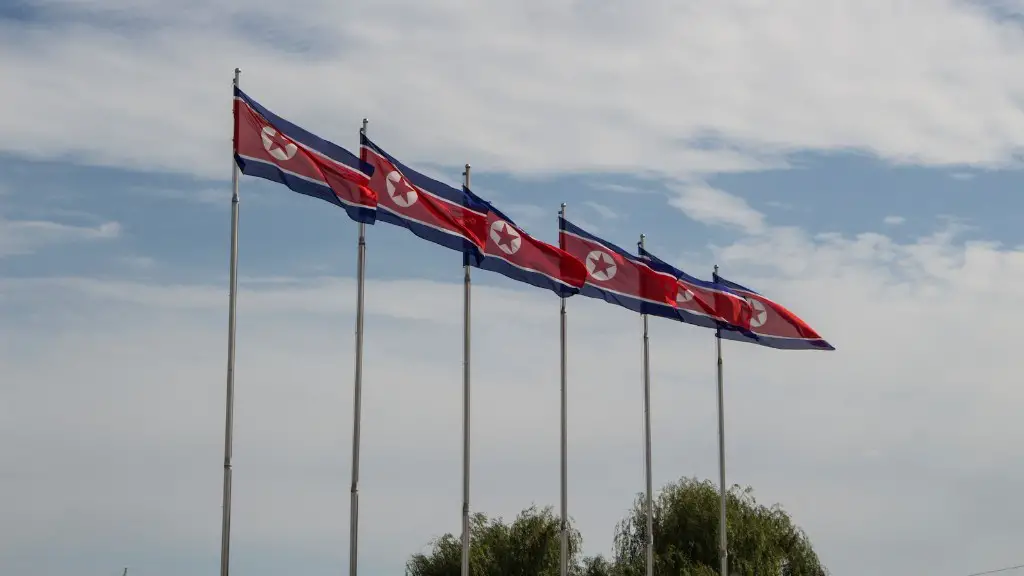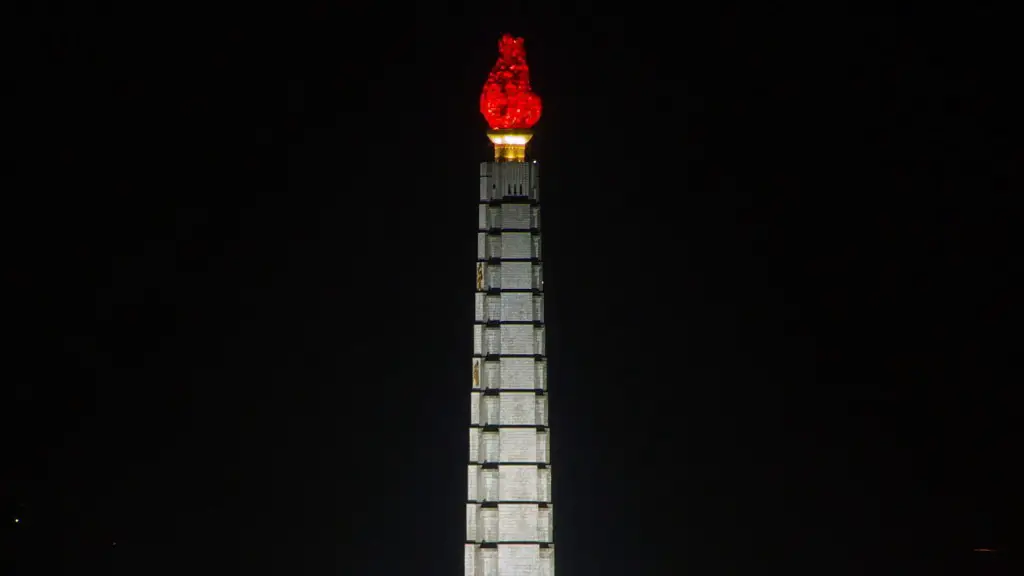North Korea’s continued existence has been a contentious issue since 1950, when the two Koreas were divided following the Korean War. The highly secretive dictatorship of Kim Jong-un has perpetuated its oppressive control over the country’s population, essentially silencing those who would attempt to oppose its doctrines. Its extensive nuclear and chemical weapon programmes have posed a growing threat to the international community, leading some observers to ask why the world allows North Korea to exist.
It is important to consider the consequences of pursuing a policy of decommissioning the state. If military intervention were to take place, there would be a high chance of further casualties as well as long-term economic and diplomatic repercussions. Not only would it require the support of multiple nations, but it is likely to destabilise the already fragile security landscape of the Korean peninsula.
Furthermore, if North Korea were to be completely dismantled, its population of 25 million people would be left to their own devices, potentially exacerbating the existing humanitarian crisis within the country and beyond. North Korea’s destitute conditions make it clear that the population would benefit more from aid and education than civil unrest.
In addition, it is important to remember that the current situation exists in part due to the fact that North Korea is a sovereign nation with a legitimate government. It has been subject to a number of United Nations Security Council resolutions in recent years, but it is still able to hold sway over its own political decisions. Its continued existence reminds us that the world cannot simply do away with a nation simply because it does not subscribe to a certain ideology.
Finally, despite the fact that North Korea’s existence poses problems for the international community, it is important to bear in mind that it is not an entirely isolated force. The country has a number of trading partners and its government still holds diplomatic relations with various countries. As a result, there is potential that the current situation could lead to some positive change, whether in the form of increased collaboration or the eventual dismantlement of the nation’s oppressive regime.
North Korea’s Nuclear Program
One of the biggest concerns of allowing North Korea to continue existing is its nuclear program. Kim Jung-un’s regime has announced its intentions of accelerating its nuclear capabilities, which already pose a major threat to the North and South of the Korean peninsula as well as the wider region and international community. This has prompted the US and other nations to enact economic sanctions and has resulted in a heightened level of tension between both sides.
The possibility of a nuclear conflict or attack is a grave risk and therefore steps are being taken to prevent that from happening. The US is attempting to engage in dialogue with the North Korean government, with the aim of reaching an agreement on denuclearisation. The hermit nation has tended to resist such negotiations, but experts have opined that it could be incentivised to change its position if it were offered economic or diplomatic rewards.
It is therefore hoped that North Korea’s nuclear ambitions will be tempered by the international diplomatic effort and a favourable outcome, in the form of a non-nuclear North Korea, can be achieved.
A Change in Policy
Given the potential benefits and risks of allowing North Korea to exist, it is important to consider a change in policy. There is an acknowledgement that the current strategy is not working and that a different approach might be required in order to bring about a lasting resolution to the conflict.
The international community could consider strengthening economic sanctions, with the aim of encouraging the North Korean regime to enter into negotiations. The US, along with its allies, could also offer incentives to North Korea, such as the freezing of US-imposed sanctions, in exchange for a commitment to denuclearisation.
Furthermore, increased diplomatic communication could be established in order to foster better relations between the two countries and to encourage more open dialogue between them. Offering the North Korean government the opportunity of increased diplomatic ties and the chance to engage in international trade may be an effective way of creating an environment whereby a peaceful solution could be attained.
Need for Action
It is clear that allowing North Korea to exist does pose risks for the international community. However, it is also important to consider the potential opportunities that the current situation presents. International negotiations, combined with the possibility of economic or diplomatic rewards, could be effective in enabling a peaceful resolution to the conflict.
Ultimately, the need for action cannot be neglected. North Korea’s nuclear programme not only endangers the region, but increases the chances of an international conflict. It is time for the world to apply pressure to the North Korean government and to enforce the various UN Security Council resolutions. Only then can a lasting peace be achieved.
Effect on South Korea
The North Korean issue has had a major impact on South Korea, with the two Koreas locked in a diplomatic stand-off for nearly 70 years. South Korea has had to bear the brunt of the North’s belligerence, facing significant economic and security problems as a result. The South is also vulnerable to any false start that the North might make and its population has been subjected to frequent missile tests. There are even reports of South Koreans crossing to the North in search of a better life.
The South has sought to demonise the North as an evil force, and the South Korean government has been vocal in its criticisms of Pyongyang. However, in recent years there have been attempts to improve ties between the two states. This has included a thawing of relations under the Moon Jae-in government and the establishment of joint projects between the two states.
Notwithstanding the mutual hostility between the two countries, it is clear that both the North and the South need to work together if there is any hope of resolving their differences. Only then can the people of Korea find true peace, security, and prosperity.
Sanctions Impact
The continued imposition of international sanctions has posed greater difficulties for the people of North Korea. These sanctions have caused severe disruption to the North’s economy, with many individuals and businesses struggling to cope with the increased pressure and the lack of access to resources.
The North Korean government has also seen its revenue decrease, forcing it to look for other sources of funding. Reports have alleged that the regime has resorted to trafficking drugs, weapons and even people. There is also evidence that North Korea has been using cyber-theft as a means of financial gain, as it attempts to bypass the sanctions imposed by the international community.
The effects of the sanctions have had a noticeable impact on the lives of ordinary North Koreans. Reports of malnutrition, poverty and disease are emerging, making it clear that the economic difficulties are resulting in humanitarian crises. It is therefore important for the international community to consider the long-term impact of the sanctions, rather than relying solely the short-term solutions that have so far failed to bring about a sustained resolution.
Alternative Solutions
An alternative solution to the ongoing North Korea problem could be the development of more creative solutions. Rather than viewing the situation as a security issue, the international community should look at the challenges North Korea faces as an opportunity to develop cross-border initiatives.
One example of this is the Kaesong Industrial Complex, located in North Korea’s South Hwanghae Province. This joint effort between the two Koreas is aimed at providing employment and production opportunities in the North while helping to develop the North’s economy. While this kind of project alone cannot solve the security issues between the two countries, it could form part of a wider solution.
Proposals for a collaborative approach to resolving the North Korea conundrum have been put forward in the past, with some experts suggesting the development of a special economic zone. If a mutually beneficial solution could be reached between the two Koreas, it could go some way towards providing relief for the North’s suffering population.
Ongoing Challenges
The ongoing challenges posed by North Korea’s existence cannot be understated. The nation remains an isolated force, operating outside of international conventions and regulations. The hermit kingdom poses one of the biggest security threats to the world, yet it still manages to evade facing consequences for its actions.
The international community must be willing to tackle the North Korea problem head on and to identify new strategies for attaining a resolution. The implementation of economic and diplomatic solutions must be coupled with attempts to strengthen international support in order to bring about a long-term truce.
Only then can the world ensure that North Korea does not continue to operate in a vacuum and that the country’s people are protected from harm. Adopting a unified stance is essential in order to achieve a lasting solution to the North Korea issue.





